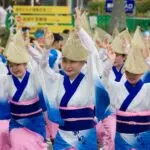Obon Festival is an annual Japanese ritual observed from the 13th to the 15th of the seventh lunar month. This year, the holiday will be celebrated from August 13 to 15. It can also be held from July 13 to 15, depending on the calendar used. Obon is similar to Mexico’s Day of the Dead and China’s Hungry Ghost Festival. During the three-day festivities, the Japanese welcome the spirits of their dead ancestors and rekindle their connections. Although it’s a festival cherishing death, Obon is more fun than creepy. People engage in fun activities, folk dance, and music events. They visit and clean the graves of the ancestors, light ‘chochin’ lanterns, and eat traditional dishes.
History of Obon Festival
Obon is a 500-year-old Buddhist custom observed to honor one’s ancestors. It is sometimes referred to as the festival of souls. It’s believed that spirits descend to earth to reunite with their living family. There’s a legend associated with the history of Obon. A Buddhist monk named Mogallana, who could see into the afterlife, prevented his dead mother from going to hell by making offerings to other monks. Having attained redemption on behalf of his mother, Mogallana started dancing in joy and the others joined him forming a big circle. This dance form came to be known as the Bon Odori dance.
Although Obon has some parallels with Halloween, it doesn’t intend to ward off spirits. Rather, the Japanese seek to welcome the souls of their ancestors by preparing delicacies and performing Bon Odori. Many also visit the tombstones of their family members and polish the surfaces. They donate flowers, candles, incense sticks, and fruits to local temples and at altars. On the last day of Obon, one is supposed to see off their ancestors by releasing sky lanterns or by burning a bonfire.
Kyoto organizes the biggest bonfires over the Daimonji Mountain. Huge effigies of kanji characters, measuring a width of 5.2 feet, are lit by Buddhist monks. The Japanese believe that the light from the fire guides the spirits back to the afterlife. If you want to experience it in Japan, the most popular spots to visit are Shikoku, Kyoto, Hokkaido, and Nagasaki. Outside of Japan, Obon is celebrated with great fervor in the U.S. and Brazil. These celebrations occur mostly in homes and Buddhist temples. Cultural and food bazaars are also held.
Obon Festival timeline
The tradition of having a family altar becomes commonplace in Japanese homes.
The Yamato Shimbun newspaper in Hawaii makes a reference to Bon Odori for the first time.
Reverend Yoshio Iwanaga introduces Bon Odori to the mainland.
Yao Kawachi Ondo Festival Association holds the world’s largest ‘bon’ dance that lasts six minutes and 16 seconds.
Obon Festival FAQs
Are there any specific rituals observed during Obon?
Yes, four important customs are observed during Obon. The festivities include Obon Iri where people set up lanterns. This is followed by Mukaebi which refers to the welcoming fire that guides ancestors home. Another ritual is the ceremonial service for the deceased known as Obon Ake or Okuribon and finally, Okuribi which is the send-off ritual where people float lanterns or release them towards the sky.
Is Obon celebrated in the U.S.?
Yes, Obon is widely celebrated in a few states of the U.S., including Oakland, San Diego, Charlotte, Philadelphia, and St. Paul.
What is the importance of Obon?
The Japanese celebrate the Obon festival to commemorate and reunite with their dead ancestors. It’s a three-day celebration that starts with welcoming the spirits and ends with guiding them back to the afterlife. The festival has special significance in Japanese culture and the Japanese folks celebrate it with full fervor engaging in dance, music events, cooking, and lighting bonfires.
Obon Festival Activities
Groove to the beats of Taiko drum
Let your guard down and dance your heart out in celebration of Obon. You may also consider learning the traditional folk dance, Bon Odori, and joining in with the dancers.
Visit a grave
If you’re Japanese or have a friend from Japan, accompany them to their ancestors’ graves and help them wash the tombstone. While you’re at it, don’t forget to offer your prayers to the deceased.
Float a lantern
One of the common rituals during Obon is to release sky lanterns or float lanterns down a river. It is believed that these lanterns guide the spirits to the other realm. As they eventually burn out, they are viewed as a send-off of these loved spirits.
5 Facts You Didn’t Know About Obon
It originated in India
Obon has Buddhist origins in India with a 500-year-old legacy.
Sanskrit name
The word ‘Obon’ is derived from the Sanskrit term ‘Ullambana’ which means ‘to hang upside down.’
It has different timings in different places
The dates for Obon might vary from place to place—mid-July in the eastern parts of Japan and mid-August in the southern regions.
A fascinating custom
The Japanese use cooling food items like eggplant, cucumber, and watermelon, into which they insert wooden chopsticks to make spirit animals.
The Largest bonfire rites
Gozan-no-Okuribi is the largest bonfire lighting practice in Japan that takes place during Obon.
Why We Love Obon Festival
Relishing Japanese delicacies
There are rituals, funeral rites, and folk dances. Obon is also about traditional Japanese food. Visit any community event, and you’ll get to relish various traditional dishes and fried noodles.
Observing Japanese traditions
Consider an authentic experience of the festival. You might visit Japan in August. Lose yourself in the merrymaking and attend fascinating events like the bonfire lighting at Kyoto. There are also festivals for dance lovers, and temple and altar visits.
Dress up in a kimono
Get into the tradition at Obon. Several “rent-a-kimono” shops across Japan let you wear the traditional attire for a day.
Obon Festival dates
| Year | Date | Day |
|---|---|---|
| 2025 | August 13 | Wednesday |
| 2026 | August 13 | Thursday |
| 2027 | August 13 | Friday |
| 2028 | August 13 | Sunday |
| 2029 | August 13 | Monday |







